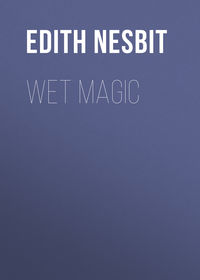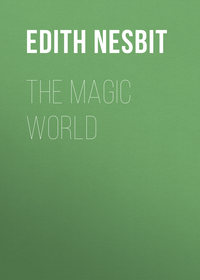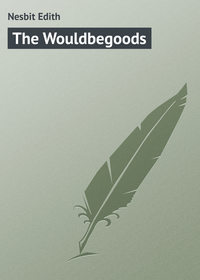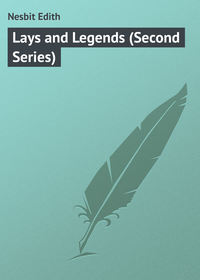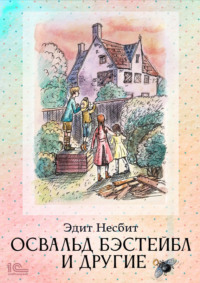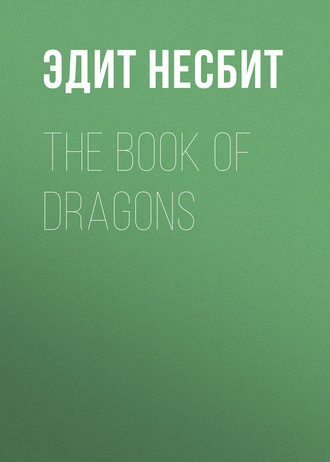 полная версия
полная версияThe Book of Dragons
But they were afraid to come out of the cave, so they went farther in, and presently the cave opened out and grew bigger, and the floor was soft sand, and when they had come to the very end of the cave there was a door, and on it was written: Universal Taproom. Private. No one allowed inside.
So they opened the door at once just to peep in, and then they remembered what St. George had said.
"We can't be worse off than we are," said Harry, "with a dragon waiting for us outside. Let's go in."
They went boldly into the taproom, and shut the door behind them.
And now they were in a sort of room cut out of the solid rock, and all along one side of the room were taps, and all the taps were labeled with china labels like you see in baths. And as they could both read words of two syllables or even three sometimes, they understood at once that they had gotten to the place where the weather is turned on from. There were six big taps labeled "Sunshine," "Wind," "Rain," "Snow," "Hail," "Ice," and a lot of little ones, labeled "Fair to moderate," "Showery," "South breeze," "Nice growing weather for the crops," "Skating," "Good open weather," "South wind," "East wind," and so on. And the big tap labeled "Sunshine" was turned full on. They could not see any sunshine—the cave was lighted by a skylight of blue glass—so they supposed the sunlight was pouring out by some other way, as it does with the tap that washes out the underneath parts of patent sinks in kitchens.
Then they saw that one side of the room was just a big looking glass, and when you looked in it you could see everything that was going on in the world—and all at once, too, which is not like most looking glasses. They saw the carts delivering the dead dragons at the County Council offices, and they saw St. George asleep under the dragonproof veil. And they saw their mother at home crying because her children had gone out in the dreadful, dangerous daylight, and she was afraid a dragon had eaten them. And they saw the whole of England, like a great puzzle map—green in the field parts and brown in the towns, and black in the places where they make coal and crockery and cutlery and chemicals. All over it, on the black parts, and on the brown, and on the green, there was a network of green dragons. And they could see that it was still broad daylight, and no dragons had gone to bed yet.
Effie said, "Dragons do not like cold." And she tried to turn off the sunshine, but the tap was out of order, and that was why there had been so much hot weather, and why the dragons had been able to be hatched. So they left the sunshine tap alone, and they turned on the snow and left the tap full on while they went to look in the glass. There they saw the dragons running all sorts of ways like ants if you are cruel enough to pour water into an ant-heap, which, of course, you never are. And the snow fell more and more.
Then Effie turned the rain tap quite full on, and presently the dragons began to wriggle less, and by-and-by some of them lay quite still, so the children knew the water had put out the fires inside them, and they were dead. So then they turned on the hail—only half on, for fear of breaking people's windows—and after a while there were no more dragons to be seen moving.
Then the children knew that they were indeed the deliverers of their country.
"They will put up a monument to us," said Harry, "as high as Nelson's! All the dragons are dead."
"I hope the one that was waiting outside for us is dead!" said Effie. "And about the monument, Harry, I'm not so sure. What can they do with such a lot of dead dragons? It would take years and years to bury them, and they could never be burnt now they are so soaking wet. I wish the rain would wash them off into the sea."
But this did not happen, and the children began to feel that they had not been so frightfully clever after all.
"I wonder what this old thing's for," said Harry. He had found a rusty old tap, which seemed as though it had not been used for ages. Its china label was quite coated over with dirt and cobwebs. When Effie had cleaned it with a bit of her skirt—for curiously enough both the children had come out without pocket handkerchiefs—she found that the label said "Waste."
"Let's turn it on," she said. "It might carry off the dragons."
The tap was very stiff from not having been used for such a long time, but together they managed to turn it on, and then ran to the mirror to see what happened.
Already a great, round black hole had opened in the very middle of the map of England, and the sides of the map were tilting themselves up, so that the rain ran down toward the hole.
"Oh, hurrah, hurrah, hurrah!" cried Effie, and she hurried back to the taps and turned on everything that seemed wet. "Showery," "Good open weather," "Nice growing weather for the crops," and even "South" and "South-West," because she had heard her father say that those winds brought rain.
And now the floods of rain were pouring down on the country, and great sheets of water flowed toward the center of the map, and cataracts of water poured into the great round hole in the middle of the map, and the dragons were being washed away and disappearing down the waste pipe in great green masses and scattered green shoals—single dragons and dragons by the dozen; of all sizes, from the ones that carry off elephants down to the ones that get in your tea.
Presently there was not a dragon left. So then they turned off the tap named "Waste," and they half-turned off the one labeled "Sunshine"—it was broken, so that they could not turn it off altogether—and they turned on "Fair to moderate" and "Showery" and both taps stuck, so that they could not be turned off, which accounts for our climate.
How did they get home again? By the Snowdon railway of course.
And was the nation grateful? Well—the nation was very wet. And by the time the nation had gotten dry again it was interested in the new invention for toasting muffins by electricity, and all the dragons were almost forgotten. Dragons do not seem so important when they are dead and gone, and, you know, there never was a reward offered.
And what did Father and Mother say when Effie and Harry got home?
My dear, that is the sort of silly question you children always will ask. However, just for this once I don't mind telling you.
Mother said: "Oh, my darlings, my darlings, you're safe—you're safe! You naughty children—how could you be so disobedient? Go to bed at once!"
And their father the doctor said: "I wish I had known what you were going to do! I should have liked to preserve a specimen. I threw away the one I got out of Effie's eye. I intended to get a more perfect specimen. I did not anticipate this immediate extinction of the species."
The professor said nothing, but he rubbed his hands. He had kept his specimen—the one the size of an earwig that he gave Harry half a crown for—and he has it to this day.
You must get him to show it to you!
IV. The Ice Dragon, or Do as You Are Told
This is the tale of the wonders that befell on the evening of the eleventh of December, when they did what they were told not to do. You may think that you know all the unpleasant things that could possibly happen to you if you are disobedient, but there are some things which even you do not know, and they did not know them either.
Their names were George and Jane.
There were no fireworks that year on Guy Fawkes' Day, because the heir to the throne was not well. He was cutting his first tooth, and that is a very anxious time for any person—even for a Royal one. He was really very poorly, so that fireworks would have been in the worst possible taste, even at Land's End or in the Isle of Man, whilst in Forest Hill, which was the home of Jane and George, anything of the kind was quite out of the question. Even the Crystal Palace, empty-headed as it is, felt that this was no time for Catherine-wheels.
But when the Prince had cut his tooth, rejoicings were not only admissible but correct, and the eleventh of December was proclaimed firework day. All the people were most anxious to show their loyalty, and to enjoy themselves at the same time. So there were fireworks and torchlight processions, and set pieces at the Crystal Palace, with "Blessings on our Prince" and "Long Live our Royal Darling" in different-colored fires; and the most private of boarding schools had a half holiday; and even the children of plumbers and authors had tuppence each given them to spend as they liked.
George and Jane had sixpence each—and they spent the whole amount on a golden rain, which would not light for ever so long, and when it did light went out almost at once, so they had to look at the fireworks in the gardens next door, and at the ones at the Crystal Palace, which were very glorious indeed.
All their relations had colds in their heads, so Jane and George were allowed to go out into the garden alone to let off their firework. Jane had put on her fur cape and her thick gloves, and her hood with the silver fox fur on it that was made out of Mother's old muff; and George had his overcoat with the three capes, and his comforter, and Father's sealskin traveling cap with the pieces that come down over your ears.
It was dark in the garden, but the fireworks all about made it seem very gay, and though the children were cold they were quite sure that they were enjoying themselves.
They got up on the fence at the end of the garden to see better; and then they saw, very far away, where the edge of the dark world is, a shining line of straight, beautiful lights arranged in a row, as if they were the spears carried by a fairy army.
"Oh, how pretty," said Jane. "I wonder what they are. It looks as if the fairies were planting little shining baby poplar trees and watering them with liquid light."
"Liquid fiddlestick!" said George. He had been to school, so he knew that these were only the Aurora Borealis, or Northern Lights. And he said so.
"But what is the Rory Bory what's-its-name?" asked Jane. "Who lights it, and what's it there for?"
George had to own that he had not learned that.
"But I know," said he, "that it has something to do with the Great Bear, and the Dipper, and the Plough, and Charles's Wain."
"And what are they?" asked Jane.
"Oh, they're the surnames of some of the star families. There goes a jolly rocket," answered George, and Jane felt as if she almost understood about the star families.
The fairy spears of light twinkled and gleamed: They were much prettier than the big, blaring, blazing bonfire that was smoking and flaming and spluttering in the next-door-but-one garden—prettier even than the colored fires at the Crystal Palace.
"I wish we could see them nearer," Jane said. "I wonder if the star families are nice families—the kind that Mother would like us to go to tea with, if we were little stars?"
"They aren't that sort of families at all, Silly," said her brother, kindly trying to explain. "I only said 'families' because a kid like you wouldn't have understood if I'd said constel … and, besides, I've forgotten the end of the word. Anyway, the stars are all up in the sky, so you can't go to tea with them."
"No," said Jane. "I said if we were little stars."
"But we aren't," said George.
"No," said Jane, with a sigh. "I know that. I'm not so stupid as you think, George. But the Tory Bories are somewhere at the edge. Couldn't we go and see them?"
"Considering you're eight, you haven't much sense." George kicked his boots against the fencing to warm his toes. "It's half the world away."
"It looks very near," said Jane, hunching up her shoulders to keep her neck warm.
"They're close to the North Pole," said George. "Look here—I don't care a straw about the Aurora Borealis, but I shouldn't mind discovering the North Pole: It's awfully difficult and dangerous, and then you come home and write a book about it with a lot of pictures, and everybody says how brave you are."
Jane got off the fence.
"Oh, George, let's," she said. "We shall never have such a chance again—all alone by ourselves—and quite late, too."
"I'd go right enough if it wasn't for you," George answered gloomily, "but you know they always say I lead you into mischief—and if we went to the North Pole we should get our boots wet, as likely as not, and you remember what they said about not going on the grass."
"They said the lawn," said Jane. "We're not going on the lawn. Oh, George, do, do let's. It doesn't look so very far—we could be back before they had time to get dreadfully angry."
"All right," said George, "but mind, I don't want to go."
So off they went. They got over the fence, which was very cold and white and shiny because it was beginning to freeze, and on the other side of the fence was somebody else's garden, so they got out of that as quickly as they could, and beyond that was a field where there was another big bonfire, with people standing around it who looked quite dark-skinned.
"It's like Indians," said George, and wanted to stop and look, but Jane pulled him on, and they passed by the bonfire and got through a gap in the hedge into another field—a dark one; and far away, beyond quite a number of other dark fields, the Northern Lights shone and sparkled and twinkled.
Now, during the winter the Arctic regions come much farther south than they are marked on the map. Very few people know this, though you would think they could tell it by the ice in the jugs of a morning. And just when George and Jane were starting for the North Pole, the Arctic regions had come down very nearly as far as Forest Hill, so that, as the children walked on, it grew colder and colder, and presently they saw that the fields were covered with snow, and there were great icicles hanging from all the hedges and gates. And the Northern Lights still seemed some way off.
They were crossing a very rough, snowy field when Jane first noticed the animals. There were white rabbits and white hares and all sorts and sizes of white birds, and some larger creatures in the shadows of the hedges that Jane was sure were wolves and bears.
"Polar bears and Arctic wolves, of course I mean," she said, for she did not want George to think her stupid again.
There was a great hedge at the end of this field, all covered with snow and icicles; but the children found a place where there was a hole, and as no bears or wolves seemed to be just in that part of the hedge, they crept through and scrambled out of the frozen ditch on the other side. And then they stood still and held their breath with wonder.
For in front of them, running straight and smooth right away to the Northern Lights, lay a great wide road of pure dark ice, and on each side were tall trees all sparkling with white frost, and from the boughs of the trees hung strings of stars threaded on fine moonbeams, and shining so brightly that it was like a beautiful fairy daylight. Jane said so; but George said it was like the electric lights at the Earl's Court Exhibition.
The rows of trees went as straight as ruled lines away—away and away—and at the other end of them shone the Aurora Borealis.
There was a signpost of silvery snow, and on it in letters of pure ice the children read: This way to the North Pole.
Then George said: "Way or no way, I know a slide when I see one—so here goes." And he took a run on the frozen snow, and Jane took a run when she saw him do it, and the next moment they were sliding away, each with feet half a yard apart, along the great slide that leads to the North Pole.
This great slide is made for the convenience of the Polar bears, who, during the winter months, get their food from the Army and Navy Stores—and it is the most perfect slide in the world. If you have never come across it, it is because you have never let off fireworks on the eleventh of December, and have never been thoroughly naughty and disobedient. But do not be these things in the hope of finding the great slide—because you might find something quite different, and then you will be sorry.
The great slide is like common slides in that when once you have started you have to go on to the end—unless you fall down—and then it hurts just as much as the smaller kind on ponds. The great slide runs downhill all the way, so that you keep on going faster and faster and faster. George and Jane went so fast that they had not time to notice the scenery. They only saw the long lines of frosted trees and the starry lamps, and on each side, rushing back as they slid on, a very broad, white world and a very large, black night; and overhead as well as in the trees the stars were bright like silver lamps, and far ahead shone and trembled and sparkled the line of fairy spears. Jane said that, and George said: "I can see the Northern Lights quite plain."
It is very pleasant to slide and slide and slide on clear, dark ice—especially if you feel you are really going somewhere, and more especially if that somewhere is the North Pole. The children's feet made no noise on the ice, and they went on and on in a beautiful white silence. But suddenly the silence was shattered and a cry rang out over the snow.
"Hey! You there! Stop!"
"Tumble for your life!" cried George, and he fell down at once, because it is the only way to stop. Jane fell on top of him—and then they crawled on hands and knees to the snow at the edge of the slide—and there was a sportsman, dressed in a peaked cap and a frozen moustache, like the one you see in the pictures about Ice-Peter, and he had a gun in his hand.
"You don't happen to have any bullets about you?" said he.
"No," George said, truthfully. "I had five of father's revolver cartridges, but they were taken away the day Nurse turned out my pockets to see if I had taken the knob of the bathroom door by mistake."
"Quite so," said the sportsman, "these accidents will occur. You don't carry firearms, then, I presume?"
"I haven't any firearms," said George, "but I have a firework. It's only a squib one of the boys gave me, if that's any good." And he began to feel among the string and peppermints, and buttons and tops and nibs and chalk and foreign postage stamps in his knickerbocker pockets.
"One could but try," the sportsman replied, and he held out his hand.
But Jane pulled at her brother's jacket-tail and whispered, "Ask him what he wants it for."
So then the sportsman had to confess that he wanted the firework to kill the white grouse with; and, when they came to look, there was the white grouse himself, sitting in the snow, looking quite pale and careworn, and waiting anxiously for the matter to be decided one way or the other.
George put all the things back in his pockets, and said, "No, I shan't. The reason for shooting him stopped yesterday—I heard Father say so—so it wouldn't be fair, anyhow. I'm very sorry; but I can't—so there!"
The sportsman said nothing, only he shook his fist at Jane, and then he got on the slide and tried to go toward the Crystal Palace—which was not easy, because that way is uphill. So they left him trying, and went on.
Before they started, the white grouse thanked them in a few pleasant, well-chosen words, and then they took a sideways slanting run and started off again on the great slide, and so away toward the North Pole and the twinkling, beautiful lights.
The great slide went on and on, and the lights did not seem to come much nearer, and the white silence wrapped around them as they slid along the wide, icy path. Then once again the silence was broken to bits by someone calling: "Hey! You there! Stop!"
"Tumble for your life!" cried George, and tumbled as before, stopping in the only possible way, and Jane stopped on top of him, and they crawled to the edge and came suddenly on a butterfly collector, who was looking for specimens with a pair of blue glasses and a blue net and a blue book with colored plates.
"Excuse me," said the collector, "but have you such a thing as a needle about you—a very long needle?"
"I have a needle book," replied Jane, politely, "but there aren't any needles in it now. George took them all to do the things with pieces of cork—in the 'Boy's Own Scientific Experimenter' and 'The Young Mechanic.' He did not do the things, but he did for the needles."
"Curiously enough," said the collector, "I too wish to use the needle in connection with cork."
"I have a hatpin in my hood," said Jane. "I fastened the fur with it when it caught in the nail on the greenhouse door. It is very long and sharp—would that do?"
"One could but try," said the collector, and Jane began to feel for the pin. But George pinched her arm and whispered, "Ask what he wants it for." Then the collector had to own that he wanted the pin to stick through the great Arctic moth, "a magnificent specimen," he added, "which I am most anxious to preserve."
And there, sure enough, in the collector's butterfly net sat the great Arctic moth, listening attentively to the conversation.
"Oh, I couldn't!" cried Jane. And while George was explaining to the collector that they would really rather not, Jane opened the blue folds of the butterfly net, and asked the moth quietly if it would please step outside for a moment. And it did.
When the collector saw that the moth was free, he seemed less angry than grieved.
"Well, well," said he, "here's a whole Arctic expedition thrown away! I shall have to go home and fit out another. And that means a lot of writing to the papers and things. You seem to be a singularly thoughtless little girl."
So they went on, leaving him too, trying to go uphill towards the Crystal Palace.
When the great white Arctic moth had returned thanks in a suitable speech, George and Jane took a sideways slanting run and started sliding again, between the star-lamps along the great slide toward the North Pole. They went faster and faster, and the lights ahead grew brighter and brighter—so that they could not keep their eyes open, but had to blink and wink as they went—and then suddenly the great slide ended in an immense heap of snow, and George and Jane shot right into it because they could not stop themselves, and the snow was soft, so that they went in up to their very ears.
When they had picked themselves out and thumped each other on the back to get rid of the snow, they shaded their eyes and looked, and there, right in front of them, was the wonder of wonders—the North Pole—towering high and white and glistening, like an ice-lighthouse, and it was quite, quite close, so that you had to put your head as far back as it would go, and farther, before you could see the high top of it. It was made entirely of ice. You will hear grown-up people talk a great deal of nonsense about the North Pole, and when you are grown up, it is even possible that you may talk nonsense about it yourself (the most unlikely things do happen) but deep down in your heart you must always remember that the North Pole is made of clear ice, and could not possibly, if you come to think of it, be made of anything else.
All around the Pole, making a bright ring about it, were hundreds of little fires, and the flames of them did not flicker and twist, but went up blue and green and rosy and straight like the stalks of dream lilies.
Jane said so, but George said they were as straight as ramrods.
And these flames were the Aurora Borealis, which the children had seen as far away as Forest Hill.
The ground was quite flat, and covered with smooth, hard snow, which shone and sparkled like the top of a birthday cake that has been iced at home. The ones done at the shops do not shine and sparkle, because they mix flour with the icing sugar.
"It is like a dream," said Jane.
And George said, "It is the North Pole. Just think of the fuss people always make about getting here—and it was no trouble at all, really."
"I daresay lots of people have gotten here," said Jane, dismally. "It's not the getting here—I see that—it's the getting back again. Perhaps no one will ever know that we have been here, and the robins will cover us with leaves and—"
"Nonsense," said George. "There aren't any robins, and there aren't any leaves. It's just the North Pole, that's all, and I've found it; and now I shall try to climb up and plant the British flag on the top—my handkerchief will do; and if it really is the North Pole, my pocket compass Uncle James gave me will spin around and around, and then I shall know. Come on."




